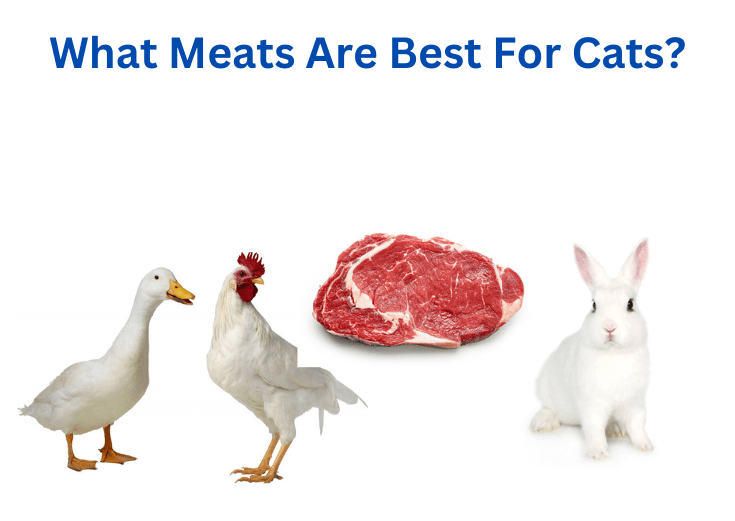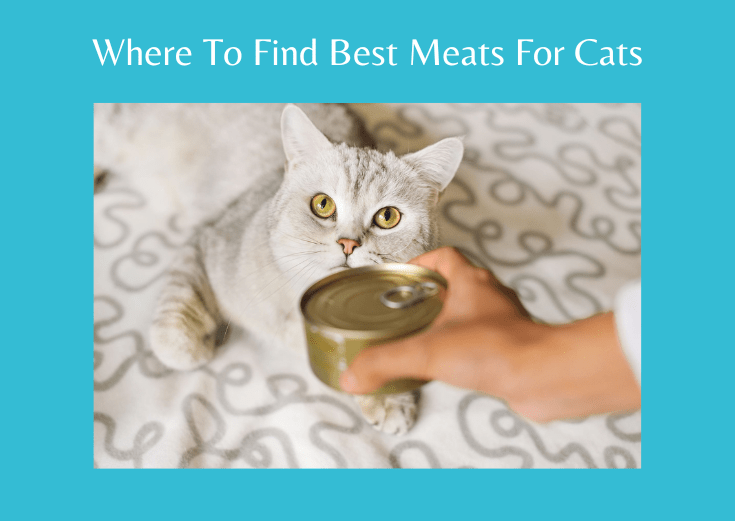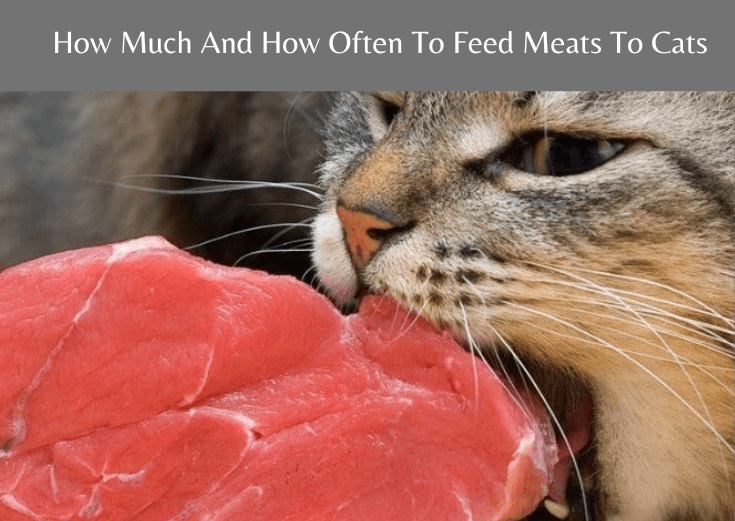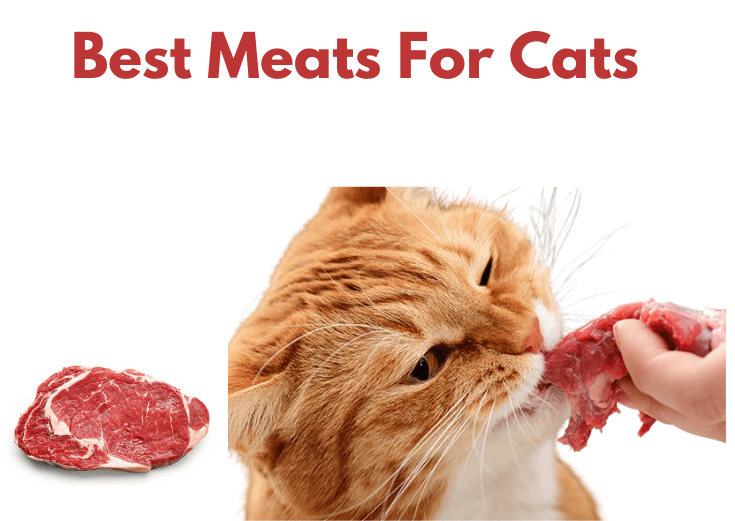If you are a cat owner, you probably want to provide the best diet for your furry friends. But do you know what meats are best for cats? Meat is an essential part of a cat’s diet, as it provides them with protein, amino acids, vitamins, minerals, and other nutrients that they need to thrive.
However, not all meats are created equal, and some may be more suitable for your cats than others. In this article, we will help you choose and feed the best meats for your cats.
We will explain why meat is important for cats, what sets good meat apart from a bad one, where to find and how to prepare meat for cats, and how much and how often to feed meat to cats. By the end of this article, you will have a better understanding of the nutritional needs of cats and how to satisfy them with the best meats available.
Contents
What meats are best for cats? Safe and High in Protein
some information about different meats to feed cats. Here are some facts and tips for each category:
- Chicken: Chicken is a common and safe meat for cats to eat. It is a lean and high-quality protein that provides essential amino acids, vitamins, and minerals for cats. Chicken can be cooked or raw, but raw chicken may carry harmful bacteria and parasites, so it is better to cook it thoroughly before feeding it to your cat. Chicken should be plain and unseasoned, as spices and additives can upset your cat’s stomach. Chicken can be fed as a treat or mixed with your cat’s regular food for variety.
- Duck: Duck is another poultry meat that cats can eat. It is a novel protein that may be suitable for cats with food allergies or sensitivities to more common meats like chicken or beef. Duck is rich in protein, taurine, iron, and zinc, and can support your cat’s immune system, digestion, and overall health. Duck should also be cooked and unseasoned, and fed in moderation, as it is higher in fat than chicken and may cause weight gain or pancreatitis if overfed. Duck can be a nice addition to your cat’s diet or a special treat.
- Turkey: Turkey is another safe and healthy meat for cats to eat. It is similar to chicken in terms of protein and nutrient content, but it may have a different flavor and texture that your cat may enjoy. Turkey can also be cooked or raw, but cooked is safer and easier to digest. Turkey should be boneless and skinless, as bones can splinter and cause choking or internal damage, and skin can be too fatty and cause digestive issues. Turkey can be a great option for your cat’s Thanksgiving feast or a regular meal.
- Beef: Beef is a popular and nutritious meat for cats to eat. It is a high-quality protein that provides essential amino acids, iron, zinc, and vitamin B12 for cats. Beef can be cooked or raw, but raw beef may carry harmful bacteria and parasites, so it is better to cook it well before feeding it to your cat. It’s necessary to know what raw meats are best for cats. Beef should be lean and unseasoned, as fatty and spicy beef can cause gastrointestinal problems or pancreatitis in cats. Beef can be a good source of variety and flavor for your cat’s diet.
- Rabbit: Rabbit is a natural and beneficial meat for cats to eat. It is a lean and novel protein that mimics the prey that cats would hunt and eat in the wild. Rabbit is rich in protein, taurine, vitamin B12, and phosphorus for cats. Rabbits can be cooked or raw, but raw rabbits may carry harmful bacteria and parasites, so it is better to cook them thoroughly before feeding them to your cat. Rabbit should be boneless and unseasoned, as bones can splinter and cause choking or internal damage, and seasonings can upset your cat’s stomach. Rabbit can be a great option for cats with food allergies or sensitivities, or for cats who prefer a more natural diet.
- Lamb: Lamb is a less common but still safe meat for cats to eat. It is a high-quality protein that provides essential amino acids, iron, zinc, and vitamin B12 for cats. Lamb can be cooked or raw, but raw lamb may carry harmful bacteria and parasites, so it is better to cook it well before feeding it to your cat. Lamb should be lean and unseasoned, as fatty and spicy lamb can cause gastrointestinal problems or pancreatitis in cats. Lamb can be a good source of variety and flavor for your cat’s diet or a substitute for cats who are allergic to other meats.
- Fish: Fish can be a good meat for cats, as it provides them with protein, amino acids, omega-3 fatty acids, and other nutrients. However, fish should not be the only meat that your cat eats, as it may also have some drawbacks. Fish can contain mercury, heavy metals, and other toxins that can harm your cat’s health. Fish can also cause allergies, urinary problems, and thyroid issues in some cats. Therefore, you should feed fish to your cat in moderation, and choose fish that are low in mercury and high in omega-3, such as salmon, sardines, or mackerel. You should also cook the fish thoroughly before feeding it to your cat, and avoid any fish that are spoiled, rotten, or contaminated.
These are some of the best meats to feed cats, but they should not be the only food that your cat eats. Cats need a complete and balanced diet that provides all the nutrients they need for optimal health and well-being. Commercial cat foods are specially formulated to meet your cat’s nutritional requirements, and they should be the main part of your cat’s diet.
Meats can be fed as occasional treats or supplements, but they should not replace your cat’s regular food. Always consult your veterinarian before making any changes to your cat’s diet, and follow their advice on how much and how often to feed your cat different meats.

What sets a good meat apart from a bad one for cats
Cats are obligate carnivores, which means they need meat to survive and thrive. Meat provides them with protein, amino acids, vitamins, minerals, and other nutrients that they cannot get from plant sources. However, what kind of meats can cats eat? ,because not all meats are created equal, and some may be more suitable for your cats than others. Here are some criteria for selecting high-quality meats for cats:
- Protein content: Protein is the most important nutrient for cats, as it supports their muscle growth, tissue repair, immune system, and overall health. Cats need more protein than dogs or humans, and they have specific amino acid requirements that only animal sources can provide. Therefore, you should choose meats that have a high protein content and a complete amino acid profile. Some examples of good meats for cats are chicken, turkey, beef, lamb, and fish. These meats are also lean and low in fat, which is good for your cat’s weight and heart health.
- Fat content: Fat is another essential nutrient for cats, as it provides them with energy, fatty acids, and fat-soluble vitamins. However, too much fat can cause obesity, diabetes, pancreatitis, and other health problems. Therefore, you should choose meats that have a moderate fat content and a balanced ratio of omega-3 and omega-6 fatty acids. Omega-3 fatty acids are anti-inflammatory and beneficial for your cat’s skin, coat, joints, and brain. Omega-6 fatty acids are pro-inflammatory and necessary for your cat’s growth and reproduction. Some examples of good meats for cats are chicken, turkey, beef, lamb, and fish. These meats have a healthy amount and balance of fat, and they are also rich in protein.
- Freshness: Freshness is another important factor for choosing meats for cats, as it affects the taste, smell, texture, and safety of the food. Fresh meats are more appealing and palatable for your cats, and they also have less risk of contamination and spoilage. Therefore, you should choose meats that are fresh and have not been exposed to high temperatures, oxygen, or bacteria. Some examples of good meats for cats are chicken, turkey, beef, lamb, and fish. These meats are easy to find and buy fresh, and they also have a long shelf life if stored properly.
- Source: Source is another important factor for choosing meats that cats can eat, as it affects the quality, sustainability, and ethics of the food. Source refers to where and how the animals were raised, fed, treated, and slaughtered. You should choose meats that come from animals that were raised in humane and natural conditions, fed a species-appropriate diet, treated with respect and care, and slaughtered in a humane and sanitary way. Some examples of good meats for cats are chicken, turkey, beef, lamb, and fish. These meats come from animals that are widely available and regulated, and they also have a low environmental impact.
Bad Meats for Cats
As you can see, there are many factors to consider when choosing meats for cats. Some meats are better than others, and some meats are best avoided. Here are some examples of bad meats for cats:
- Pork: Pork is a bad meat for cats, as it is high in fat, salt, and calories, and low in protein and amino acids. Pork can cause obesity, diabetes, pancreatitis, and other health problems for your cats. Pork can also contain parasites, bacteria, and toxins that can harm your cats. Therefore, you should avoid feeding pork to your cats, or feed it only in small amounts and occasionally.
- Raw eggs: Raw eggs are bad meat for cats, as they can contain salmonella, E. coli, and other harmful bacteria that can cause food poisoning and infections for your cats. Raw eggs can also contain avidin, a protein that interferes with the absorption of biotin, a vitamin that is essential for your cat’s skin, coat, and metabolism. Therefore, you should avoid feeding raw eggs to your cats, or cook them thoroughly before feeding them.
- Bones: Bones are bad meat for cats, as they can splinter and cause choking, intestinal blockage, perforation, and bleeding for your cats. Bones can also damage your cat’s teeth, gums, and mouth. Therefore, you should avoid feeding bones to your cats, or feed them only in small pieces and under supervision.
- Processed meats: Processed meats are bad meat for cats, as they are high in salt, preservatives, additives, and artificial flavors and colors that can cause dehydration, kidney problems, allergies, and cancer for your cats. Processed meats can also contain low-quality meats, by-products, fillers, and other ingredients that are not suitable for your cat’s nutrition. Therefore, you should avoid feeding processed meats to your cats, or feed them only in small amounts and rarely.
These are some examples of bad meats for cats, but there are many more to avoid. You should always check the label and ingredients of any meat product you buy for your cats, and consult your veterinarian if you have any doubts or questions.
Learn More How to Make Batter Your Cat Diet:
Where to find and how to prepare best meats for cats
Once you have Understand What meats are best for cats? and select the best meats to feed your cats, you need to know where to find them and how to prepare them. There are different sources of meat for cats, such as commercial pet food, homemade meals, raw feeding, and supplements. Each source has its pros and cons, and you should choose the one that suits your cat’s needs and preferences. Here are some tips on where to find and how to prepare meats for cats:

- Commercial pet food: Commercial pet food is the most convenient and common source of meat for cats. You can find it in any pet store, supermarket, or online shop. Commercial pet food comes in various forms, such as dry kibble, wet canned food, or freeze-dried food. Commercial pet food is usually formulated to meet the nutritional requirements of cats, and it has a long shelf life and easy storage. However, commercial pet food may also contain low-quality meats, by-products, fillers, preservatives, additives, and artificial flavors and colors that can harm your cat’s health. Therefore, you should choose commercial pet food that has a high meat content, a complete amino acid profile, a moderate fat content, and a balanced ratio of omega-3 and omega-6 fatty acids. You should also check the label and ingredients of any commercial pet food you buy for your cats, and consult your veterinarian if you have any doubts or questions. Some examples of good commercial pet food for cats are [Purina ONE High Protein Natural Dry Cat Food], [Wellness CORE Natural Grain Free Wet Canned Cat Food], and [Stella & Chewy’s Freeze-Dried Raw Dinner Morsels for Cats].
- Homemade meals: Homemade meals are another source of meat for cats. You can make them yourself using fresh meats that you buy from the butcher, the farmer’s market, or the supermarket. Homemade meals give you more control over the quality, quantity, and variety of meats for your cats. Homemade meals are also more natural and palatable for your cats, and they can help you save money and avoid wasting food. However, homemade meals may also be time-consuming and labor-intensive to prepare, and they may not provide a balanced and complete nutrition for your cats. Therefore, you should follow a reliable and vet-approved recipe when making homemade meals for your cats, and supplement them with vitamins, minerals, and other nutrients that your cats may need. You should also cook the meats thoroughly before feeding them to your cats, and avoid adding any salt, spices, or seasonings that can irritate your cat’s digestive system. Some examples of good homemade meals for cats are [Chicken and Rice Cat Food Recipe], [Beef and Vegetable Cat Food Recipe], and [Salmon and Sweet Potato Cat Food Recipe].
- Raw feeding: Raw feeding is another source of meat for cats. Raw feeding is based on the idea that cats are natural carnivores and that they should eat a diet that mimics their ancestors in the wild. Raw feeding involves feeding your cats raw meats, bones, organs, and other animal parts that provide them with protein, amino acids, vitamins, minerals, and other nutrients that they need. Raw feeding is also more natural and palatable for your cats, and it can improve their dental health, digestion, immunity, and coat condition. However, raw feeding may also be risky and controversial for your cats. Raw feeding can expose your cats to parasites, bacteria, and toxins that can cause food poisoning and infections for your cats. Raw feeding can also damage your cat’s teeth, gums, and mouth, and cause choking, intestinal blockage, perforation, and bleeding for your cats. Therefore, you should be cautious when feeding raw meats to your cats, and follow the guidelines and recommendations of a professional and experienced raw feeder. You should also freeze the meats before feeding them to your cats, and avoid feeding any meats that are spoiled, rotten, or contaminated. Some examples of good raw meats for cats are [Darwin’s Natural Pet Products Raw Cat Food], [Primal Pet Foods Raw Frozen Cat Food], and [Feline Natural Grain-Free Freeze-Dried Cat Food].
- Supplements: Supplements are another source of meat for cats. Supplements are products that provide your cats with additional protein, amino acids, vitamins, minerals, and other nutrients that they may not get enough from their regular diet. Supplements can help your cats meet their nutritional needs and prevent or treat any deficiencies or health problems that they may have. Supplements can also enhance your cat’s appetite, energy, and performance. However, supplements may also be unnecessary and harmful for your cats. Supplements can cause overdosing, toxicity, and interactions with your cat’s medications or other supplements. Therefore, you should only use supplements for your cats when they are prescribed or recommended by your veterinarian, and follow the instructions and dosages carefully. You should also choose supplements that are made from natural and high-quality ingredients, and avoid any supplements that contain artificial flavors, colors, or preservatives. Some examples of good supplements for cats are [Zesty Paws Pure Wild Alaskan Salmon Oil for Cats], [VetriScience Laboratories GlycoFlex Plus for Cats], and [Nutramax Cosequin Sprinkle Capsules for Cats].
These are some tips on where to find and how to prepare meat for cats. You should choose the source that suits your cat’s needs and preferences, and provide them with the best meat possible.
Suggested: Can Cats Drink Coconut Water?
My Dog Ate Grapes And Nothing Happened
How much and how often to feed meat to cats
Now that you know what meats are best for cats and where to find them and how to prepare them, you need to know how much and how often to feed them. The amount and frequency of meat feeding for cats depends on several factors, such as age, weight, activity level, and health conditions. There is no one-size-fits-all answer, but there are some general guidelines you can follow. Here are some tips on how to measure the right portions of meat for cats and how often to feed them:
- How to measure the right portions of meat for cats: The right portion of meat for cats varies depending on their calorie needs, which are influenced by their age, weight, activity level, and health conditions. A general rule of thumb is to feed your cats about 2 to 4 percent of their body weight per day, divided into two meals. For example, if your cat weighs 10 pounds, you should feed them about 0.2 to 0.4 pounds of meat per day, or about 3 to 6 ounces. You can use a scale, a cup, or a percentage of body weight to measure the portions of meat for your cats. However, these are only estimates, and you should adjust them according to your cat’s appetite, body condition, and behavior. You should also consult your veterinarian if you have any doubts or questions.
How much meat to feed your cat based on its weight and lifestyle
| Weight of the Cat in Kilograms | Daily Portion of Meat in Grams |
| Up to 2 | 120 to 160 |
| 2 to 3 | 160 to 210 |
| 3 to 4 | 210 to 260 |
| 4 to 5 | 240 to 320 |
| 5 to 6 | 250 to 360 |
- How often to feed meat to cats: The frequency of meat feeding for cats also varies depending on their age, weight, activity level, and health conditions. A general rule of thumb is to feed your cats twice a day, once in the morning and once in the evening. This helps to keep their blood sugar levels stable and prevent overeating. However, some cats may prefer to eat more or less often, depending on their individual preferences and habits. You should observe your cat’s eating patterns and adjust them accordingly. You should also consult your veterinarian if you have any doubts or questions.
These are some tips on how much and how often to feed meat to cats. You should always monitor your cat’s weight, body condition, and behavior, and make changes as needed. You should also provide your cats with fresh water at all times, and avoid giving them any foods that are toxic or harmful to them.

Conclusion
If you are a pet owner it’s necessary to know what meats are best for cats. Meat is an essential part of a cat’s diet, as it provides them with protein, amino acids, vitamins, minerals, and other nutrients that they need to thrive. However, not all meats are created equal, and some may be more suitable for your cats than others. In this article, we have helped you choose and feed the healthiest meats for your cats. We have explained why meat is important for cats, what sets a good meat apart from a bad one, where to find and how to prepare meats for cats, and how much and how often to feed meats to cats. By following these tips, you will be able to provide your cats with a balanced and natural diet that will support their overall health and wellbeing.
FAQs About what meats are best for cats?
Q: Why do cats need meat in their diet?
- A: Cats need meat in their diet because they are obligate carnivores, which means they require animal protein to survive and thrive. Meat provides them with essential amino acids, vitamins, minerals, and other nutrients that they cannot get from plant sources. Meat also supports their muscle growth, tissue repair, immune system, and overall health.
Q: What are the best meats for cats to eat?
- A: The best meats for cats to eat are those that are high in protein, low in fat, fresh, and sourced from animals that were raised in humane and natural conditions. Some examples of good meats for cats are chicken, turkey, beef, lamb, and fish. These meats are lean, digestible, and rich in amino acids, iron, zinc, and vitamin B12.
Q: What are the worst meats for cats to eat?
- A: The worst meats for cats to eat are those that are high in fat, salt, calories, and additives, and low in protein and amino acids. Some examples of bad meats for cats are pork, raw eggs, bones, and processed meats. These meats can cause obesity, diabetes, pancreatitis, and other health problems for your cats. They can also contain parasites, bacteria, and toxins that can harm your cats.
Q: How to prepare and feed meat to cats?
- A: You can prepare and feed meat to cats in different ways, such as commercial pet food, homemade meals, raw feeding, or supplements. Each method has its pros and cons, and you should choose the one that suits your cat’s needs and preferences. You should also cook the meats thoroughly before feeding them to your cats, and avoid adding any salt, spices, or seasonings that can irritate your cat’s digestive system. You should also measure the right portions and frequency of meat feeding for your cats, based on their age, weight, activity level, and health conditions.
Q: Where to find and buy meat for cats?
- A: You can find and buy meat for cats in various places, such as pet stores, supermarkets, online shops, butcher shops, or farmer’s markets. You should look for meats that are fresh, high-quality, and certified by reputable sources. You should also check the label and ingredients of any meat product you buy for your cats, and consult your veterinarian if you have any doubts or questions.




